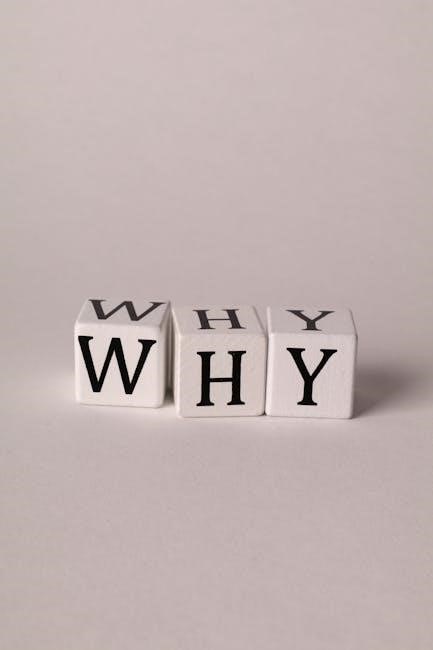maths riddles with answers pdf

Math riddles are engaging puzzles that combine logic, creativity, and numerical skills․ They offer fun challenges for all ages, with answers provided for self-assessment․
What Are Math Riddles?
Math riddles are clever, brain-teasing puzzles that combine numerical and logical reasoning with creative thinking․ They often involve arithmetic, algebra, geometry, or wordplay to challenge problem-solving skills․ These riddles present mathematical concepts in an engaging way, requiring critical thinking and lateral reasoning․ For example, questions like “How do you make 7 even?” or “What number becomes 13 when multiplied by 2?” test creativity and logic․ Many riddles are designed to be fun and educational, offering solutions that surprise and delight․ They are suitable for all ages, from simple arithmetic puzzles to complex algebraic brain teasers․ Math riddles also foster resilience, as they encourage repeated attempts to find the solution․ With answers provided, they serve as excellent tools for learning and entertainment․
Why Math Riddles Are Popular
Math riddles are popular because they blend fun with learning, making them engaging for all ages․ They challenge problem-solving skills and encourage critical thinking, often requiring creative approaches․ Riddles also build resilience, as they may need multiple attempts to solve․ They enhance logical reasoning and make math more appealing, boosting motivation and confidence․ Many riddles are designed to be shared, fostering collaboration and enjoyment․ Their versatility—covering arithmetic, algebra, geometry, and wordplay—makes them suitable for diverse skill levels․ The availability of answers in resources like PDF guides allows for self-assessment and learning․ Overall, math riddles are a delightful way to sharpen mental abilities while having fun, making them a beloved activity for both kids and adults․

Types of Math Riddles
Math riddles come in various forms, including arithmetic, algebra, logic, wordplay, and geometry-based puzzles․ Each type challenges different skills, offering diverse problem-solving experiences for all skill levels․
Arithmetic Riddles
Arithmetic riddles focus on basic mathematical operations like addition, subtraction, multiplication, and division․ They often present simple yet tricky problems that test your ability to think creatively․ For example, one riddle asks how to turn 98 into 720 by adding a single letter, challenging you to think outside the box․ These riddles are great for improving fundamental math skills while having fun․ They also help build resilience as you may need multiple attempts to find the solution․ With answers provided, you can verify your results and learn from your mistakes․ These riddles are perfect for all ages, making arithmetic practice enjoyable and engaging․
Algebra Riddles
Algebra riddles are clever puzzles that challenge your ability to set up and solve equations․ They often involve wordplay, hidden patterns, or unexpected twists․ For example, one riddle asks, “A number is three times as old as his daughter․ In 20 years, he will be twice her age․ How old are they now?” These riddles require you to translate words into mathematical expressions and solve for unknowns․ They are excellent for sharpening algebraic thinking and problem-solving skills․ With answers provided, you can check your work and learn from any mistakes․ Algebra riddles are both educational and entertaining, making them a great way to practice algebra in a fun and engaging way․

Logic and Wordplay Riddles
Logic and wordplay riddles blend math with clever language, testing both numerical and linguistic skills․ These riddles often rely on puns, double meanings, or lateral thinking․ For instance, “What number becomes even when you add a letter?” The answer involves wordplay rather than complex calculations․ These riddles enhance critical thinking and creativity, making math more enjoyable․ They are perfect for those who enjoy brain teasers that challenge the mind in unique ways․ With answers provided, you can verify your solutions and improve your problem-solving strategies․ Logic and wordplay riddles are a fun and interactive way to engage with mathematics creatively․
Geometry Riddles
Geometry riddles challenge spatial reasoning and shape recognition, often involving circles, triangles, and other geometric figures․ These riddles test understanding of properties like angles, sides, and dimensions․ For example, “What shape has a head, a tail, but no body?” The answer lies in geometric interpretation․ Such riddles are great for visual learners, fostering creativity and problem-solving skills․ With answers provided, you can verify your solutions and deepen your geometric knowledge․ Geometry riddles make learning about shapes and dimensions engaging and fun, suitable for all skill levels․ They are an excellent way to enhance spatial awareness and logical thinking through interactive puzzles․

Benefits of Solving Math Riddles
Solving math riddles enhances critical thinking, boosts math engagement, and fosters resilience․ These challenges make learning fun while improving problem-solving skills and logical reasoning abilities․
Improving Problem-Solving Skills
Solving math riddles sharpens problem-solving abilities by encouraging creative and analytical thinking․ These challenges often require breaking down complex ideas into manageable steps, fostering resilience as learners tackle puzzles that may initially seem unsolvable․ By repeatedly attempting riddles, individuals develop persistence and adaptability, essential for overcoming obstacles in math and real-world scenarios․ Riddles also refine logical reasoning, as they often involve clever twists or wordplay, teaching learners to approach problems from multiple angles․ Over time, this practice enhances the ability to identify patterns, simplify equations, and think critically, making math more accessible and enjoyable․ These skills are invaluable for both academic success and everyday problem-solving․
Enhancing Critical Thinking
Math riddles are powerful tools for enhancing critical thinking by challenging individuals to approach problems creatively․ They often require analyzing information, identifying patterns, and applying mathematical concepts in unconventional ways․ Solving these riddles demands attention to detail and the ability to interpret clues accurately․ For instance, logic-based riddles force users to think outside the box, while wordplay riddles rely on clever interpretations of language․ These exercises strengthen the ability to dissect complex problems into simpler components, a key skill in mathematics․ By consistently engaging with math riddles, learners develop a sharper, more analytical mindset, which not only improves their math proficiency but also enhances their overall cognitive agility and problem-solving efficiency․
Boosting Engagement in Math
Math riddles are an exceptional way to boost engagement in mathematics by making learning fun and interactive․ They transform complex concepts into enjoyable challenges, capturing the interest of learners at all levels․ Whether it’s solving arithmetic puzzles, deciphering wordplay, or tackling logic-based problems, riddles create a sense of excitement and curiosity․ By presenting math in a less traditional format, they encourage students to think creatively and explore numerical relationships in a relaxed manner․ This approach not only makes math more accessible but also fosters a positive attitude toward problem-solving․ Engaging with math riddles regularly can motivate learners to delve deeper into mathematical concepts, turning a potentially daunting subject into an enjoyable adventure․

How to Create Your Own Math Riddles
Creating math riddles involves blending numerical concepts with clever wordplay or logical twists․ Start by selecting a math topic, such as arithmetic or geometry․ Next, craft a question that presents the problem in an unconventional way, often incorporating puns or unexpected scenarios․ For example, use real-world objects or humorous situations to disguise the math behind the riddle․ Ensure the riddle is challenging yet solvable, providing a clear answer․ To enhance engagement, include hints or visual elements if needed․ By tailoring riddles to different skill levels, you can make them accessible and enjoyable for a wide audience․ This approach not only tests mathematical knowledge but also encourages creative thinking and problem-solving skills․

Top Tips for Solving Math Riddles
Mastering math riddles requires a strategic approach․ First, read carefully to identify key numbers and relationships․ Break down complex problems into simpler parts, focusing on one element at a time․ Look for patterns, as they often hint at the solution․ Practice mental math to quickly compute essential calculations․ Additionally, think creatively—riddles frequently rely on wordplay or unexpected interpretations of numbers․ Use visual aids like diagrams or equations to organize information․ Finally, verify your answer by plugging it back into the riddle to ensure it fits logically․ Regular practice with various types of riddles will sharpen your problem-solving skills and boost your confidence in tackling challenging math puzzles․
Resources for Math Riddles with Answers
Discover a variety of math riddles with answers in PDF guides and worksheets․ These resources offer puzzles for all skill levels, from basic arithmetic to advanced algebra, with detailed solutions․
PDF Guides and Worksheets
PDF guides and worksheets are excellent resources for accessing math riddles with answers․ These documents are designed for various skill levels, from children to adults, offering a wide range of challenges․ They include arithmetic riddles, algebraic puzzles, and logic-based brain teasers, ensuring there’s something for everyone․ Many guides feature step-by-step explanations, making them ideal for self-study or classroom use․ Worksheets are often themed, covering topics like geometry, number sequences, and word problems․ With answers provided, users can easily track their progress and learn from their mistakes․ These PDFs are a convenient and engaging way to sharpen mathematical and critical thinking skills in a fun and interactive manner․
Math riddles are engaging puzzles that enhance problem-solving skills, critical thinking, and math fluency․ They cater to all ages, offering fun challenges that range from simple arithmetic to complex logic․ With resources like maths riddles with answers PDF, learners can access structured guides and worksheets tailored to their skill levels․ These materials provide clear explanations and solutions, making them ideal for self-study or classroom activities․ By exploring these riddles, individuals can develop a deeper appreciation for mathematics while enjoying the thrill of solving clever puzzles․ Whether for education or entertainment, math riddles are a timeless and rewarding way to sharpen your mind and build confidence in mathematical abilities․